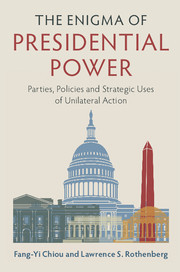Description
The Enigma of Presidential Power
Parties, Policies and Strategic Uses of Unilateral Action
Authors: Chiou Fang-Yi, Rothenberg Lawrence S.
Presidents are more constrained in exercising unilateral actions than before. This book asks: when does unilateral action correspond to presidential power?
Language: English
Subject for The Enigma of Presidential Power:
30.28 €
In Print (Delivery period: 14 days).
Add to cart
The Enigma of Presidential Power
Publication date: 04-2017
242 p. · 15.3x22.8 cm · Paperback
Publication date: 04-2017
242 p. · 15.3x22.8 cm · Paperback
96.56 €
In Print (Delivery period: 14 days).
Add to cart
The Enigma of Presidential Power
Publication date: 04-2017
242 p. · 15.7x23.6 cm · Hardback
Publication date: 04-2017
242 p. · 15.7x23.6 cm · Hardback
Description
/li>Contents
/li>Biography
/li>
With gridlock, presidents increasingly rely on unilateral actions - means not requiring legislative statutes - which many view as tantamount to power. Using a variety of approaches, Chiou and Rothenberg show that this need not be the case as, under many conditions, the chief executive's employment of such tools is constrained. Rather, presidents contemplating issuing executive orders are often constrained by worries about challenging the legislature and the courts. Most notably, the ability of Congress to employ extra-statutory means, involving efforts by legislators and their parties that don't require passing a law, limit how presidents utilize their discretion. Additionally, political parties can influence presidential choices and actions both by restricting the ideological direction in which presidents can push policy via discretionary authority and by agenda-setting and disciplining members in the legislative process. Nor are all presidential actions equal, as the policy area involved and the importance of an action condition presidential power.
1. Introduction; 2. Thinking about power: theoretical models; 3. Not all unilateral actions are created equal: measuring the significance of executive orders; 4. The race for power: empirically examining competing models; 5. Bringing the parties in: legislative partisan influence and presidential power; 6. The subtleties of power - assessing the two presidencies; 7. Conclusions - solving the enigma of presidential power.
Fang-Yi Chiou is Full Research Fellow at the Institute of Political Science at Academia Sinica, Taipei, Taiwan. He has published on a variety of subjects in important political science journals, such as the Journal of Politics and the American Journal of Political Science. He was selected to be a member of the Global Young Academy (2010–16), was the recipient of the Elinor Ostrom Award, and has received five prestigious Taiwanese national research awards.
Lawrence S. Rothenberg is the Corrigan-Minehan Professor of Political Science and Director of the W. Allen Wallis Institute of Political Economy at the University of Rochester, New York. He is the author of four books, numerous journal articles, and was a recently a co-principal investigator of a multimillion dollar Integrative Graduate Education and Research Traineeship (IGERT) grant for research and training in energy.
Lawrence S. Rothenberg is the Corrigan-Minehan Professor of Political Science and Director of the W. Allen Wallis Institute of Political Economy at the University of Rochester, New York. He is the author of four books, numerous journal articles, and was a recently a co-principal investigator of a multimillion dollar Integrative Graduate Education and Research Traineeship (IGERT) grant for research and training in energy.
© 2024 LAVOISIER S.A.S.




